Refugee by Alan Gratz was chosen for two Texas Library Association lists: The Lone Star List and The Bluebonnet List! I didn’t even know that was possible. The other reason I chose Refugee from the suggested lists was the timely topic of refugees and how people react.
Why I Finished It:
The only reason why someone would not finish Refugee is from heartache! This book follows three children and their families through horrendous times in history: Nazi Germany, Fidel Castro in Cuba, and Assad in Syria (still happening, unfortunately). Gratz shares fictional stories based on real events of how families have been brutally forced from their homes, separated from loved ones, and treated like property. Through his masterfully told story, he challenges us “regular humans” to take a stand, to be compassionate, and be willing to fight degrading treatment of humans in the face of danger. I finished it quickly, but it will stew in my head for a long time. This book easily goes down on my list of favorite books of all time: The Crossover, Deadline, and How They Croaked.
Who I Would Give It To:
HUMANS! All humans need this book! Regardless of the target audience (4-8 grade), Refugee is emotionally raw and forces the reader outside of their comfort zone to be more humane! And let’s be honest, these events are still happening in our world today, so there’s the current connection as well.
Integration Ideas:
Informal Research of Current and Historical Events
There is no denying that Gratz is a master of the written word, however much of the power of this story for me is in the fact that I knew the history! I know quite a bit about the treatment of Jews under Nazi rule, I knew less (but still enough) about Castro’s reign of terror, and I am familiar with Assad’s rule of Syria. Knowing the historical context on some level, made me connect with the children in this story in an intense way! I want my students to have that same connection, so I would divide my class into three sections and have them conduct informal research as a group on these three times in history. Then each group will present out to the others.
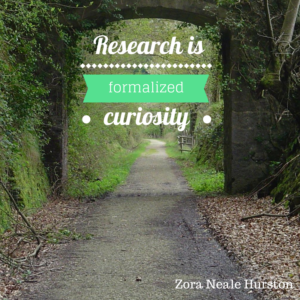 Please note: this is not a formal presentation. There won’t be a five paragraph essay when the students are complete. I will not grade how long their presentation is or force them to use one type of tool to present, I just want the students to have the opportunity to authentically practice research skills, listening and speaking, and develop background knowledge (schema) on the historical moments.
Please note: this is not a formal presentation. There won’t be a five paragraph essay when the students are complete. I will not grade how long their presentation is or force them to use one type of tool to present, I just want the students to have the opportunity to authentically practice research skills, listening and speaking, and develop background knowledge (schema) on the historical moments.
Here are some links to help (please note the sensitivity of the subject matter and preview sites before you hand them out):
- Syria:
- Larry Ferlazzo’s Blog – Resources (links and videos) on what’s happening in Syria
- Kid World Citizen – Maps, resources, videos and how to help sites
- The Guardian – Download a “where it all began” document
- Germany:
- Education World – Teaching the Holocaust
- Ducksters Education Site – World War II – Holocaust overview of information
- Scholastic – A Collection of Resources to teach the Holocaust
- US Holocaust Museum Site – Resources for students
- Cuba:
- Encyclopedia Britannica – Fidel Castro
- CNN – A timeline of Castro
- Teaching Social Responsibility – Cuba and the US
- Ducksters – Fidel Castro
Theme and Essential Questions
We always pull out one or two major themes from a novel and create an essential question. Refugee is about survival and courage from the point of view of the refugee for sure, but it is also about the courage of those not directly affected, the courage to step up and make a change.
 In his interview with Booksource Banter, Gratz mentiones that when he visits schools he challenges students by putting them in a refugee’s shoes. What would they do? What do you bring? Who would support you? I love the idea of asking the question before the book is even handed out, “What would force you to abandon your home and/or leave your home country?”
In his interview with Booksource Banter, Gratz mentiones that when he visits schools he challenges students by putting them in a refugee’s shoes. What would they do? What do you bring? Who would support you? I love the idea of asking the question before the book is even handed out, “What would force you to abandon your home and/or leave your home country?”
Possible essential questions:
- What responsibility, if any, do we have to strangers in a crisis?
- When is it important to fight for civil rights? How can a child fight for civil rights?
There are so many more possibilities with this powerful book, but I am passionate about creating social activists in my classroom. The ideas in Refugee really go nicely with bullying programs in schools and the idea of standing up for someone who is being abused, or becoming invisible, so the tables don’t get turned on you.
A few powerful points brought up in the book (and there are way more than what I’m sharing) are:
- How do people survive and change through such horrendous treatment? Do people become somewhat of a shell, devoid of feelings and with a broken spirit? Do they become outspoken and brazen? Do they try to hide and become invisible?
- Becoming a victim of a reign of terror can happen to anyone at any time if people allow it to happen. If people sit by and ignore these catastrophic events, they are silently condoning such behavior.
Vocabulary:
This book has great word choice and I pulled out some vocabulary. Please choose only a handful to teach! I also pulled out some content language/words to bring to students attention as they read.
- rationing (8)
- recoiled (9 & 181)
- indignation (17)
- summoned (28)
- melodious (30)
ethereal (30 - catatonic (31)
- lurched (36)
- gaunt (36)
- disinfected (40)
- waning (60)
- inlet (62)
- artillery (70)
- paranoia (74)
- asylum (90)
- dissident (100)
- ominous (108)
- profusely (115)
- inconsolable (133)
- dinghy (141)
- berating (148)
- oppressive (148)
- pandemonium (158)
- respite (160)
- incoherently (183)
- chastised (190)
- somber (224)
- instantaneous (240)
- condolences (241)
- mutiny (254)
Content words:
- swastika (3 & 35)
- brownshirts (3)
- synagogues (5)
- Kristallnacht (5)
- communist (8)
- Mu’adhadhin (30)
- Mecca (31)
- Guantanamo Bay (42)
- hijab (66)
- Daesh (66)
- yarmulkes (75)
- Torah (75)
- “The Storm of the Century” (154)
Research and Take Action
This book is too powerful to end when the students finish reading. Have them continue learning about refugees (past and present). Have them learn what they can do to help and what organizations are trying to make a difference. Here are some sites:
- Facing History and Ourselves Lesson Plan
- Amnesty International – resources to understand the refugee crisis
- Brown University – The Choices Program
- Annenberg Media – Curriculum Resources for Teaching about Refugees
- The UN Refugee Agency – Teaching Resources
- Pulitzer Center – What is it like to be a refugee?
- Refugee lesson plan
Author website – https://www.alangratz.com/writing/refugee/
We would love to hear your feedback on the book or lesson ideas!
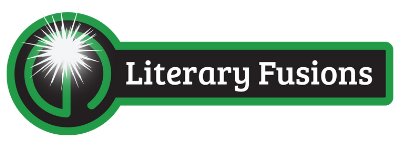
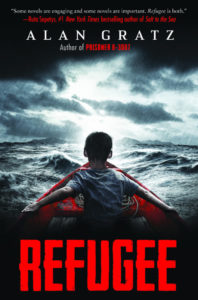



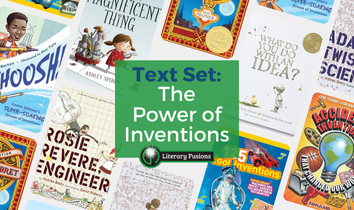
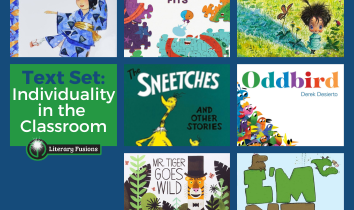
This information is very helpful.Thank you.
Love your review:)
Thank you!
Nice
I read the book. It was good. 😉
It is still one of our favorites!
I’m reading the book right now for school but I honestly would read it in my own time!!! Great review btw.
Thank you. We feel the same way about that book. It is definitely a favorite with our students.
I’m reading it currently and I was looking at so many different websites learning about things I never knew and this helped so much thank you.
We are so glad it helped. It is a really interesting history!